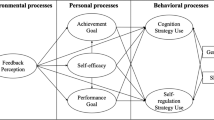Abstract
An experiment tested the impact of performance feedback on self-focused attention in high and low achievers. On the basis of previous research, which suggested that inconsistent feedback (i.e., feedback which contradicts one's performance history) receives considerable attention, it was predicted that such feedback would increase self-focus regardless of its valence (i.e., positive or negative). As predicted, high achievers were more self-focused when receiving failure feedback than when receiving success feedback or no feedback. The low achievers were more self-focused when receiving success feedback than when receiving failure feedback or no feedback. These findings are discussed in relation to Kluger and DeNisi's (1996) Feedback intervention theory and the literature on self-focused attention.
Similar content being viewed by others
References
Albert, Stuart (1977). Temporal comparison theory. Psychological Review, 84, 485–503.
Baumgardner, Ann H. (1990). To know oneself is to like oneself: Self-certainty and self-affect. Journal of Personality and Social Psychology, 58, 1062–1072.
Bem, Daryl, J. (1972). Self-perception theory. In L. Berkowitz (Ed.), Advances in experimental social psychology (Vol. 6). New York: Academic Press, pp. 1–62.
Butler, Ruth (1987). Task-involving and ego-involving properties of evaluation: Effects of different feedback conditions on motivational perceptions, interest and performance. Journal of Educational Psychology, 79, 474–482.
Campbell, Jennifer D. (1990). Self-esteem and clarity of the self-concept. Journal of Personality and Social Psychology, 59, 538–549.
Carver, Charles S. & Scheier, Michael F. (1981). Attention and self-regulation: A control-theory approach to human behavior. New York: Springer-Verlag.
Cohen, Sheldon (1978). Environmental load and the allocation of attention. In A. Baum, J. E. Singer, & S. Valins (Eds), Advances in environmental psychology. Hillsdale, NJ: Lawrence Erlbaum Associates, pp. 1–29.
Duval, Shelley & Wicklund, Robert, A. (1972). A theory of objective self-awareness. New York: Academic Press.
Exner, John E. (1973). The self-focus sentence completion: A study of egocentricity. Journal of Personality Assessment, 37, 437–455.
Goethals, George, R. & Darley, John, M. (1987). Social comparison theory: Self-evaluation and group life. In B. Mullen & G. R. Goethals (Eds), Theories of group behavior. New York: Springer-Verlag, pp. 21–47.
Greenberg, Jeff & Pyszczynski, Tom (1986). Persistent high self-focus after failure and low self-focus after success: The depressive self-focusing style. Journal of Personality and Social Psychology, 50, 1039–1044.
Huguet, Pascal, Galvaing, Marie-Pierre, Monteil, Jean-Marc, & Dumas, Florence (1999). Social presence effects in the Stroop Task: Further evidence for an attentional view of social facilitation. Journal of Personality and Social Psychology, 77, 1011–1025.
Kluger, Avraham N. & DeNisi, Angelo (1996). The effects of feedback interventions on performance: A historical review, a meta-analysis, and a preliminary feedback intervention theory. Psychological Bulletin, 119, 254–284.
Kluger, Avraham N., Lewinsohn, Shai, & Aiello, John, R. (1994). The influence of feedback on mood: Linear effects on pleasantness and curvilinear effects on arousal. Organizational Behavior and Human Decision Processes, 60, 276–299.
Levine, John, M. (1983). Social comparison and education. In J. M. Levine & M. C. Wang (Eds), Teacher and student perception: Implications for learning. Hillsdale, NJ: Erlbaum, pp. 29–56.
Markus, Hazel R. (1977). Self-schemata and processing information about the self. Journal of Personality and Social Psychology, 35, 63–78.
Markus, Hazel R. & Smith, Jeanne (1981). The influence of self-schemata on perception of the others. In N. Cantor & J. Kilstrom (Eds), Personality, cognition, and social interaction. Hillsdale, NJ: Erlbaum, pp. 233–262.
Marshall, Hermine H. & Weinstein, Rhona S. (1984). Classroom factors affecting students' self-evaluations: An interactional model. Review of Educational Research, 54, 301–325.
Martinot, Delphine & Monteil, Jean-Marc (1995). The academic self-schema: An experimental illustration. Learning and Instruction, 5, 63–76.
Monteil, Jean-Marc (1988). Comparison sociale. Stratégies individuelles et médiations socio-cognitives. Un effet de différenciations comportementales dans le champ scolaire. European Journal of Psychology of Education, 3, 3–18.
Monteil, Jean-Marc (1991). Social regulations and individual cognitive functioning: Effects of individuation on cognitive performance. European Journal of Social Psychology, 21, 225–237.
Monteil, Jean-Marc, Brunot, Sophie, & Huguet, Pascal (1996). Cognitive performance and attention in the classroom: An interaction between past and present academic experiences. Journal of Educational Psychology, 88, 356–370.
Monteil, Jean-Marc & Huguet, Pascal (1999). Social context and cognitive performance: Towards a social psychology of cognition. London: Psychology Press.
Palfai, Tibor P. & Salovey, Peter (1992). The influence of affect on self-focused attention: Conceptual and methodological issues. Consciousness and Cognition, 1, 306–339.
Salovey, Peter (1992). Mood-induced self-focused attention. Journal of Personality and Social Psychology, 62, 699–707.
Sedikides, Constantine (1992). Mood as a determinant of attentional focus. Cognition and Emotion, 6, 129–148.
Swann, William B, Jr. (1983). Self-verification: Bringing social reality into harmony with the self. In J. Suls & A. G. Greenwald (Eds), Social psychological perspective on the self. Hillsdale, NJ: Erlbaum, pp. 33–66.
Swann, William B, Jr. (1987). Identity negotiation: Where two roads meet. Journal of Personality and Social Psychology, 53, 1038–1051.
Wegner, Daniel M. & Giuliano, Toni (1980). Arousal-induced attention to self. Journal of Personality and Social Psychology, 38, 719–726.
Wood, Joanne V., Saltzberg, Judith A., & Goldsamt, Lloyd A. (1990). Does affect induce self-focused attention, coping responses, and distressed mood in everyday life? Journal of Personality and Social Psychology, 58, 899–908.
Author information
Authors and Affiliations
Rights and permissions
About this article
Cite this article
Brunot, S., Huguet, P. & Monteil, JM. Performance feedback and self-focused attention in the classroom: When past and present interact. Social Psychology of Education 3, 271–293 (1999). https://doi.org/10.1023/A:1009631930740
Issue Date:
DOI: https://doi.org/10.1023/A:1009631930740




